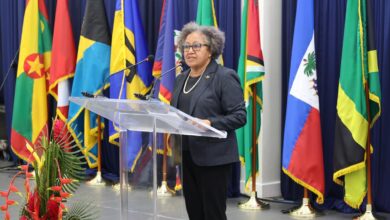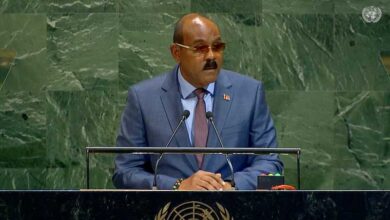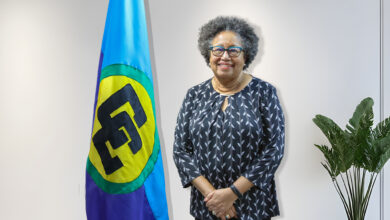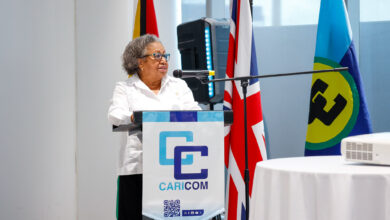Please see video of CARICOM Secretary-General’s address to the High Level Segment of COP 21 at this link:
As the second week climate negotiations in Paris rolls on, the Caribbean Community (CARICOM) is continuing to advocate for a legally binding Paris Agreement that limits long term temperature increase to no more than 1.5 degrees Celsius.
CARICOM Secretary-General on Tuesday addressed the High Level Segment of the 21st Meeting of the Conference of Parties (COP21) to the United Nations Framework Convention on Climate Change, emphasizing that a long term temperature increase of 2 degrees Celsius is too high. The draft Paris Agreement is vacillating around multiple options, including: below 1.5 °C or well below 2 °C, but the CARICOM is firm that below 1.5 °C is necessary for the survival of Small Island Developing States (SIDS) of CARICOM, as well as Guyana and Suriname.
“Even as the global temperature increase has crossed the one degree centigrade mark above pre-industrial levels, we are already experiencing the impact of climate change.
The science is clear. The Structured Expert Dialogue has reported categorically that a goal of 2 degrees centigrade is too high. It is critical therefore that the increase be contained below 1.5 degrees centigrade. If that target is not attained, it would be beyond our capacity to adapt. For us in CARICOM that translates into a matter of survival,” Ambassador LaRocque told the Meeting.
He capitalized on the opportunity to reinforce the Region’s other goals, stating that the Caribbean wishes to reiterate the need for an ambitious, high performance, legally binding agreement with universal participation which also includes:
- Recognition of, and provision for, the special circumstances of SIDS, as well as the prioritisation of their access to public grant-based financing. The criteria for access to such funding must also be based on vulnerability and not solely on GDP per capita;
- Strengthened support for adaptation and scaled up financial resources with proportionate balance between mitigation and adaptation;
- Recognition of Loss and Damage as a central element of the Agreement.
- Reaffirmation of the contribution of Reducing Emissions from Deforestation and Degradation (REDD Plus) to mitigation efforts, also with adequate incentives and institutional and financial support for implementation.
“Climate Change is negatively impacting our Region. We, in the Caribbean Community are living it. We do not have the luxury of time. We must all act now,” the CARICOM Secretary-General told the Paris Meeting.
CARICOM negotiators have been working assiduously to ensure that the Region’s positions are included in the text of the Paris agreement. They have been supported by a strong CARICOM presence in Paris that included CARICOM Heads of Governments and officials; the CARICOM Secretariat Caribbean Youth Environment Network (CYEN), and PANOS. There is also a Caribbean Pavilion that has given the Region a highly visible presence to showcase the effects of climate change and efforts to address its impacts. It has also been hosting presentations to advance the international community’s knowledge of the unique circumstances and special vulnerability of CARICOM SIDS.






